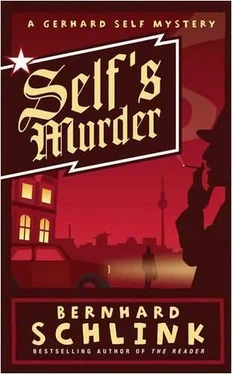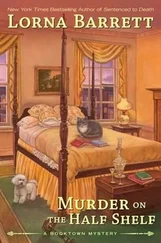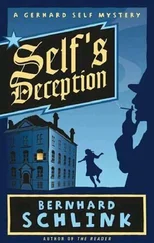Then came the time for me to start walking again. I made my way up and down the corridor, out into the garden, and around the pond, but I was worried that a rash movement might loosen whatever was clogging my arteries and send it wandering to an even more dangerous place. I knew this fear was foolish. But it was there. I was also afraid that the pain would return, that my heart might start beating irregularly, that it would stop beating altogether. I was afraid of dying.
Needless to say, while I lay there waiting, images and scenes from my life came to my mind. My childhood in Berlin, my career as public prosecutor, my marriage to Klara, my work as private investigator, my years with Brigitte. I also mulled over my last case, which I hadn’t concluded the way I’d wanted to.
“I’m glad you didn’t do anything to Welker,” Brigitte said. “It rattled you, but it didn’t kill you. You’ll get back on your feet again.”
It was only later that I fully understood what Brigitte meant. I wasn’t reading the papers, nor watching or listening to the news. But one day I came across an old copy of the Mannheimer Morgen lying on a bench in the garden and the headline caught my eye: EXPLOSION IN SCHWETZINGEN. I read that a bomb had exploded in a bank in Schwetzingen. Nobody had been seriously injured, but there was extensive damage. The culprit, a recently fired employee, was detained on the scene with minor injuries by other employees and arrested by the police. The bomb seems to have gone off sooner than he expected. The lead article focused on the matter of the bomb: it was the wrong way to respond to a dismissal, regardless of whether the dismissal was justified or not. But the article pointed out that the culprit was from Cottbus, and that citizens from the former East Germany, after forty-five years of Communism, often found it difficult to come to terms with the open labor market and often regarded a dismissal as a stain on their honor. The article went on to make a few insightful remarks about crimes for lost honor.
I sat on the bench and thought about Karl-Heinz Ulbrich. I would ask Brigitte to go visit him in prison and take him a good book, a good Bordeaux, and some fresh fruit. I wanted her to take him a chess set, too, and my Spassky vs. Korchnoi. Chess was widely played in the East. I wanted her to ask Nägelsbach to put in a good word with his former colleagues. Crimes committed because of a loss of honor-the writer of that article didn’t know how right he was.
I had to return to my room, where the lady doctor handed me a release to sign absolving them of all responsibility. I thought that was all she wanted, but then she checked my heart, took my blood pressure, and examined my behind.
The following morning one of the nurses shaved my chest, stomach, pubic hair, and thighs, which had been already shaved for the angiogram. Brigitte had to leave the room, as if this ultimate nakedness might reveal something dreadful. When I sat up and looked down at myself, I was moved by my hairless, defenseless organ. I was so moved that I was on the brink of tears. I realized that they had put a sedative in my drip.
Brigitte walked next to me as far as the elevator, and the male nurse wheeled me in at an angle from which I could still see her until the doors closed. She blew me a kiss.
In the elevator I grew sleepy. I can still remember being wheeled out of the elevator through a corridor into the operating theater and being lifted onto the operating table. The last thing I remember is the harsh light of the lamp overhead and the doctors’ faces with masks and caps, with peering eyes whose expressions I couldn’t figure out. Perhaps there wasn’t anything to figure out. The doctors began their work.
In the end I did head back there.
Why? I knew all there was to know, and if I hadn’t, the Schlossplatz would not have told me anything. I already knew that Welker had fired half his staff and sold the Sorbian bank. That he had dissolved Weller & Welker. That his house in the Gustav-Kirchhoff Strasse is up for sale and that he’s moved away with his children-to Costa Rica, Brigitte says, and that his wife is still alive and waiting for him there.
I also knew that Ulbrich hadn’t breathed a word to the police or the public prosecutor. Not a word. Brigitte had asked me: “Weren’t you a public prosecutor once? Can’t you defend him?” I made inquiries and found that I could get licensed as a lawyer. The fact that Welker had left town would make the defense easier.
What was I looking for on Schwetzingen’s Schlossplatz? The end of this story? It had come to an end. None of the threads of fate had been left dangling. But though I knew at the end of a story justice didn’t always have to win out, I could not accept as an ending that Welker would get away with what he’d done while Ulbrich was in jail and Schuler and Samarin were dead and buried. Again I was tortured by the powerlessness of not being able to do anything anymore, not being able to fix things.
Until I realized that it was my decision whether I would interpret the ending as unjust and unsatisfactory and suffer because of it or decided that this, and only this, was the fitting ending. In either case it was my decision. Even Welker dead or Welker in prison, and a happy Karl-Heinz Ulbrich, and a Schuler who went on cultivating his files, and a Samarin who went on laundering money were not entirely just and satisfactory. I was the one who would have to decide. So I tried. I didn’t accept the end without question. But wasn’t there something fitting about Samarin, a warrior, being killed in action, and Schuler having died for the truth that lay hidden in his beloved archive? It could be arranged that Ulbrich wouldn’t have to stay in prison for too long. As for Welker? Brigitte and I could go to Costa Rica on vacation.
If the doctor allows it. He’s an old friend of Philipp’s and was a colleague of his in Mannheim before Philipp took over the department at the Speyerer Hof Clinic. The doctor shakes his head and shrugs his shoulders when I ask him about my condition and what I am to expect.
“What can I say, Herr Self? Your heart is worn out.”
Worn out. I’m quite aware that the operation wasn’t a success. Otherwise they would have told me. And I wouldn’t have been so tired. Sometimes I feel as if my tiredness is out to poison me.
I was happy when the taxi arrived.

Bernhard Schlink was born in Germany. He is the author of the internationally best selling novels The Reader and Homecoming , as well as the collection of short stories Flights of Love and four prizewinning crime novels- Self’s Punishment (with Walter Popp), The Gordian Loop , Self’s Deception, and Self’s Murder . He lives in Berlin and New York.
***















